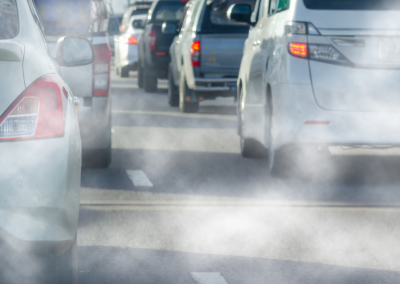Lithuania fails to meet EU commitments to reduce emissions
The European Commission (EC) has announced that it has referred Lithuania to the Court of Justice of the European Union (CJEU) for non-compliance with the emission reduction commitments set out in Directive (EU) 2016/2284 of the European Parliament and of the Council.
The CJEU has also been informed that Bulgaria, Portugal and Sweden are not complying with the requirements of the Directive.
The Court can rule that a Member State has breached its obligations under the Directive. In this case, the Member State will have to take measures to remedy the infringement and implement the decision. If the CJEU rules that the Member State still fails to take measures to comply, the EC may continue the infringement procedure, i.e. it may refer the Member State back to court, already proposing to impose sanctions on the Member State for failure to implement the decision.
The EC considers that Lithuania has failed to meet its commitments to reduce emissions of nitrogen oxides and non-methane volatile organic compounds. Significant amounts of nitrogen oxides are emitted by lorries, buses and car transport, non-methane volatile organic compounds from the production and storage of petroleum products and the use of paints, and the burning of stationary fuels in households.Ministries of Transport, Energy, Economy and Innovation, and Agriculture are responsible for reducing emissions of these pollutants at the national level, and it is therefore crucial for the responsible public authorities to find effective solutions to reduce national air pollution.
Since 2023, when the EC launched this infringement procedure, Lithuania last year adopted amendments to its National Air Pollution Reduction Plan 2030. The plan added new measures to reduce Lithuania's emissions of particulate matter, nitrogen oxides, ammonia and non-methane volatile organic compounds, to improve air quality, and to accelerate the achievement of the Directive's air pollution reduction targets.
One of the new measures is to tighten most ambient air quality standards for particulate matter, nitrogen dioxide, sulphur dioxide and heavy metals. Successful measures will also be continued to modernise apartment and public buildings, encourage the purchase of electric cars, public transport, cycling, further develop alternative fuel infrastructure and transport, provide investment support for the installation of biogas plants for manure and other biodegradable waste, encourage people to replace solid fuel heating with efficient new heating or switch to a different method of heating using renewable energy sources, etc.We are 15.3% behind the target for nitrogen oxides and 3.4% behind the target for non-methane volatile organic compounds, and the Ministry of the Environment has asked other institutions to come forward with proposals to reduce emissions. Only the Ministry of Transport and Communications has submitted some proposals, and proposals are expected from other ministries responsible for national air pollution reduction.The National Air Pollution Reduction Plan will be updated as soon as possible following the receipt of proposals from the responsible ministries. It is expected to be approved by the Government by the middle of next year and submitted to the EC by the end of the summer.













































































































